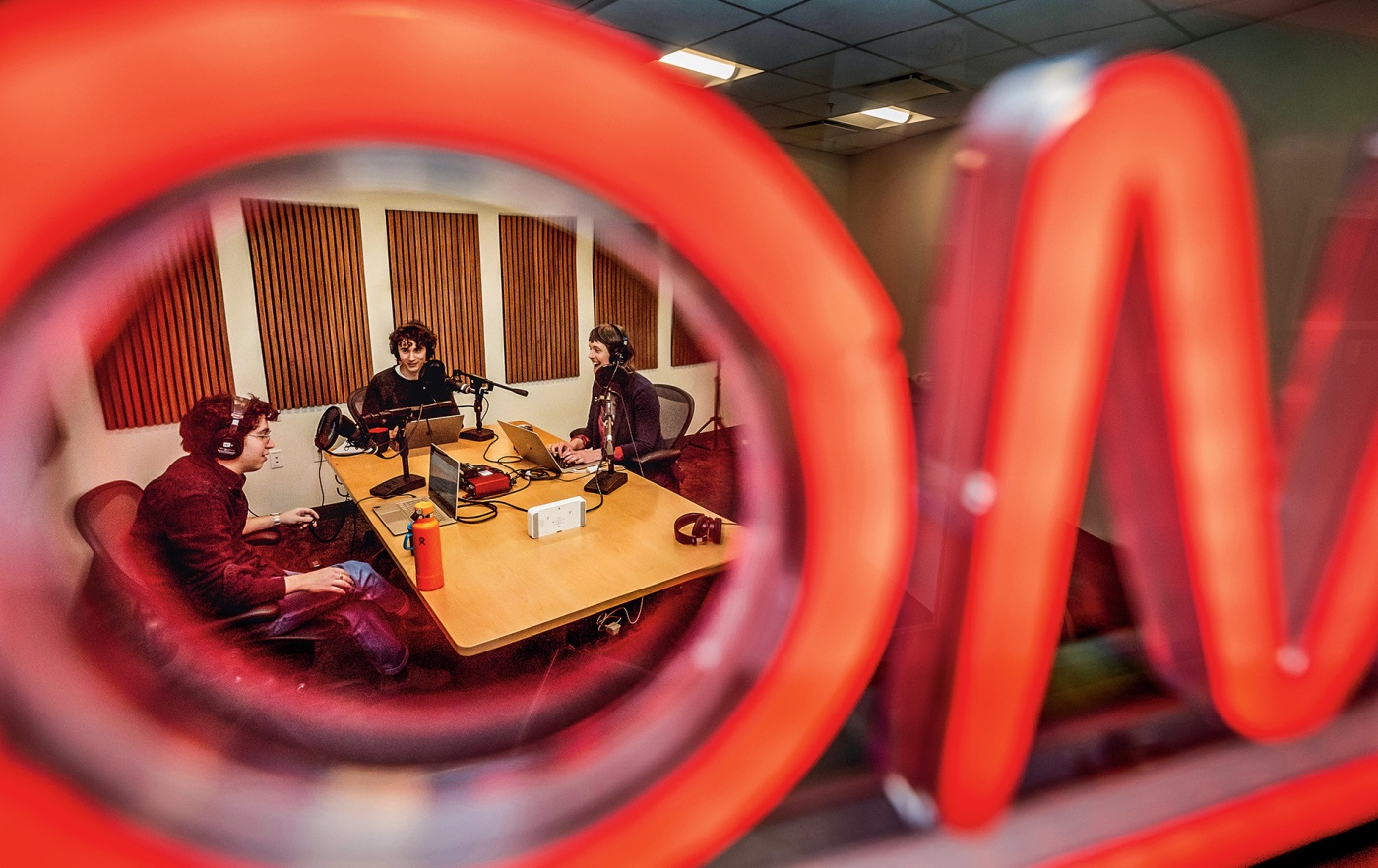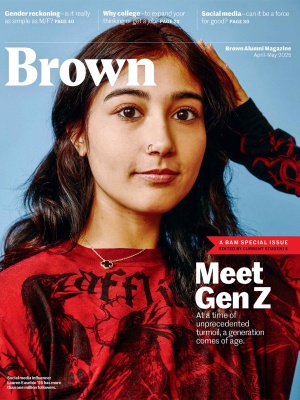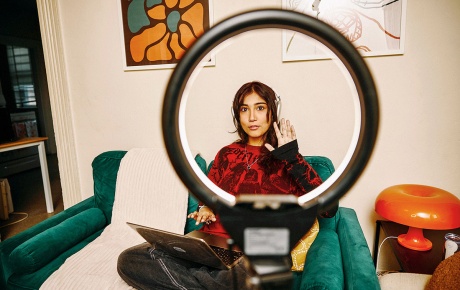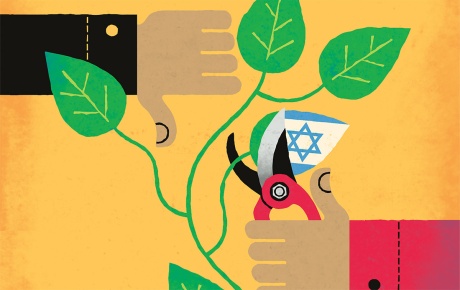Bite-Sizing Climate Action
A Brown-based podcast fights climate-change overwhelm, one “let’s break this down” episode at a time.

Climate change coverage by its nature tends to be gloomy—a relentless march of temperature and sea level rises tending toward seemingly inevitable collapse. While that clear-eyed realism is important, says Brown ecology professor Stephen Porder, it can be paralyzing as well. So when Rhode Island Public Radio general manager Torey Malatia called him to thank him for a recent donation years ago, he took the opportunity to pitch him on an idea for a radio podcast that would address the issue in a more positive light.
“It wasn’t about trying to convince people that climate change was real, it was about things people could do that would actually be helpful,” says Porder. Malatia connected him with local radio producer Megan Hall ’04, ’15 MPH, and together they created Possibly, a podcast and radio show featuring short episodes (clocking in around four minutes) that strive to be as entertaining as they are informative about everyday actions people can take to address environmental sustainability. “We’re trying to show people they can be hopeful and proactive,” says Porder, who is also Brown’s associate provost for sustainability.
“Our intent is really to sort through all of the noise and say here’s what’s worth paying attention to, and here are things you don’t need to obsess about,” adds Hall, who teaches a course at the Institute at Brown for Environment & Society, Podcasting for the Common Good: Storytelling with Science. Since 2019, the show has aired more than 268 episodes, appearing at times as a segment during National Public Radio’s Morning Edition and All Things Considered programs on 40 stations in 20 states, as well as a stand alone podcast on Apple, Spotify, and other platforms. From the beginning, the Brown-based program has also been a training ground for student journalists interested in science communication, teaching them how to promote essential content with breezy delivery.
That tone was set from the first program, says Hall, when two students came in with a script about plastic straws that came across as stilted and formal. Before taping, Hall suggested they have a casual conversation instead, and it turned out to be so much more engaging that they decided on a lightly scripted conversational style as the format of the show. Through their collaboration, Porder and Hall aim to strike the right balance between precision and listenability. “I’ll rewrite a sentence to make it more audio-friendly,” says Hall, “then he’ll rewrite it to make it more scientifically accurate, and then I’ll rewrite it again. I really appreciate the back and forth we have.”
Reaching a Wider Audience
Most Possibly episodes include conversations with experts, frequently Brown faculty, who relish sharing their research with a wider audience. “I appreciate the opportunities to reach outside of campus and show how research can be of interest beyond the classroom,” says Bathsheba Demuth, an environmental historian of the Arctic who appeared on a segment about the idea of wilderness. After it was aired on a station in Alaska, the state office of the National Parks Service contacted her to collaborate on new public-facing materials about the Alaskan wilderness.
Baylor Fox-Kemper, an environmental sciences professor and a lead author on the most recent report by the Intergovernmental Panel on Climate Change, commends Possibly for filling a unique niche in climate change communication. “We’ve shifted from 60 percent of people not believing climate change is real to 75 percent of people believing it is real, but a large fraction of them feel like there is nothing they can do about it,” he says. “I think they’ve hit the right tone in breaking through that communication barrier.”
Possibly employs around ten student reporters, who pitch ideas, interview experts, and go out into the field to investigate local environmental issues before writing, recording, and editing their segments. Lead reporter Will Malloy ’25 joined the program after taking Hall’s class as a sophomore. A double concentrator in English and science, technology and society, he was frustrated about the lack of opportunities to share research outside the ivory tower. “It’s awesome if we’re coming up with climate solutions, but it doesn’t really matter unless we can get those ideas out into the rest of the world,” says Malloy, who among other topics has interviewed farmers about climate change’s impact on maple syrup production and examined the environmental impact of instant coffee versus espresso pods.
Working on the podcast is a crash course on how to communicate complex ideas to the public, Malloy says. “You can say a specific action emits X amount of CO2, but how much is 5 tons of CO2 versus 5,000 tons?” he says. He’s learned to use analogies—for example, saying emissions are equivalent to five plane trips from New York to L.A.—or using percentages rather than amounts.
A Legacy in the making
A growing cohort of Possibly alums have gone on to use the skills they’ve gained in work as science communicators. Molly Magid ’19 was one of the first student reporters with the podcast and now works as a communications manager at an environmental nonprofit in New Zealand. “One of the big things I took away is that just because the environment is a serious topic doesn’t mean it needs to be treated seriously all the time,” says Magid, who now produces the podcast Big Biology, in which two biologists interview colleagues about their discoveries.
Fatima Husain ’17 was a science editor for the College Hill Independent while at Brown and joined Possibly as an advisor to students as she was pursuing a master’s in science writing at MIT. “It was the opportunity of a lifetime,” she says now. “Working hard to uphold standards was an incredibly formative experience in making me a better journalist and enriched my reporting significantly.” Now a PhD student in geochemistry at MIT, she uses skills she picked up at Possibly while teaching a class on environmental policy.
Other alums have gone into journalism, including Max Kozlov ’20, a science reporter at Nature, and Luci Jones ’23, a production assistant at Wonder Media Network, a New York–based audio studio focusing on women’s stories. One of the most recent Possibly alums, Janek Schaller ’24, is currently an editorial fellow at Midstory, a nonprofit media organization focusing on the Midwest, where he is working on a podcasting series about agricultural innovation and the future of farming. Schaller notes that while print media is struggling, podcasts continue to thrive, presenting a unique opportunity to educate the public on environmental issues. “People find the human voice inherently compelling,” he says. “They are inclined to listen.”





